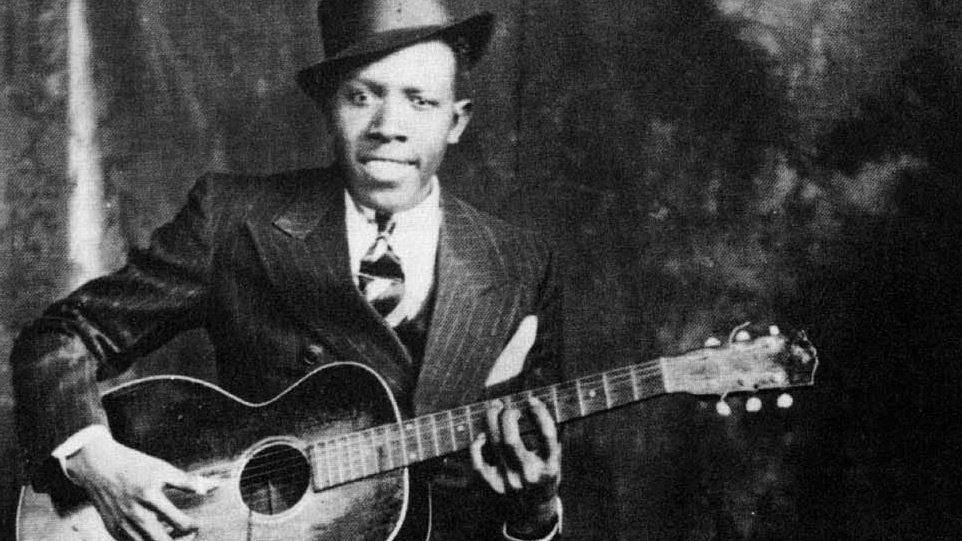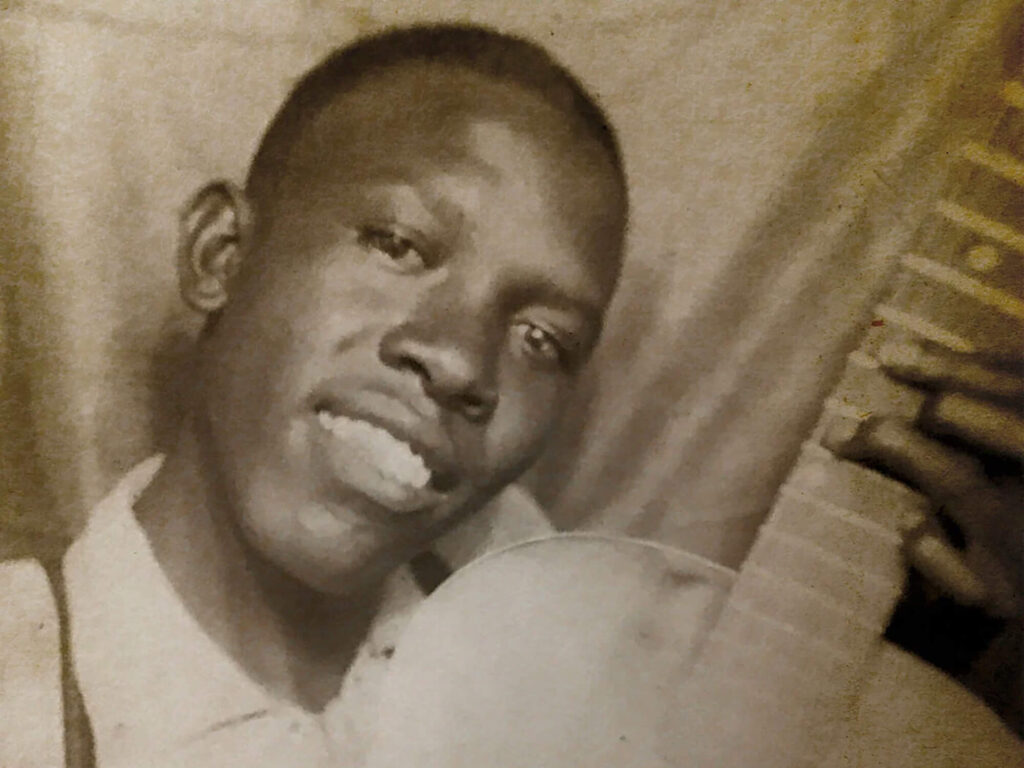
Robert Johnson (May 8, 1911 – August 16, 1938) is one of the most enigmatic and influential figures in the history of American music.
Known for his groundbreaking guitar work, soulful singing, and poignant lyrics, Johnson’s contributions to the blues genre, especially the Delta blues style, have had a profound impact on a diverse range of musicians and musical movements.
Although his recording career lasted a mere seven months, the legacy he left behind transcends the brevity of his life and his modest discography. With only 29 songs, Johnson’s work has inspired countless musicians, solidifying his place as a foundational figure in both blues and rock music. The Rock and Roll Hall of Fame describes him as “the first ever rock star,” capturing the timeless nature of his appeal and influence.
Early Life and Background
Robert Leroy Johnson was born on May 8, 1911, in Hazlehurst, Mississippi. He was the 11th child of Julia Major Dodds and Noah Johnson, who were sharecroppers. His early life was shaped by the socioeconomic conditions of the Deep South during the early 20th century. Sharecropping was a grueling way of life, one that many African American families endured as part of the post-slavery agrarian system that maintained racial and economic hierarchies. Johnson moved frequently in his youth, as his mother relocated several times following her separation from his father. At one point, Johnson even adopted the surname of his stepfather, Charles Dodds, and became known as Robert Spencer for a period.
Johnson’s early experiences with music likely came from the influence of itinerant blues musicians, gospel choirs, and the folk music traditions embedded in the culture of the rural South. However, he didn’t immediately gravitate toward the blues. His initial attempts at playing guitar were met with disapproval by his family, who considered secular music and especially blues as “the devil’s music.” Yet, Johnson persisted and became a passionate student of the blues, taking influence from local blues musicians like Son House and Willie Brown.
The Legend of the Crossroads
One of the most captivating aspects of Robert Johnson’s life is the myth that surrounds him. According to popular legend, Johnson made a deal with the devil to achieve his prodigious musical talent. The story goes that he went to a crossroads at midnight, where he sold his soul in exchange for unparalleled mastery of the guitar. The legend reflects the struggle between religious values and secular art forms within the African American community at the time, as well as Johnson’s seemingly inexplicable leap in skill as a guitarist.
.
.
Though stories of musicians making deals with supernatural forces for musical success were common in Southern folklore, Johnson’s tale endures because of his intense charisma and haunting songs. Tracks like “Cross Road Blues” and “Hellhound on My Trail” give voice to themes of loneliness, despair, and existential angst, themes that some listeners interpreted as signs of his otherworldly pact. Of course, the story also benefited from the lack of concrete details about Johnson’s life and the scarcity of his recorded work, which only added to his mysterious allure.
Recording Sessions and Style
Robert Johnson‘s entire recorded legacy was created in two sessions—one in San Antonio, Texas, in November 1936 and another in Dallas, Texas, in June 1937. During these sessions, he recorded 29 songs, including some that would become defining pieces of the blues genre, such as “Sweet Home Chicago,” “Cross Road Blues,” “Love in Vain,” and “Me and the Devil Blues.” These recordings are characterized by Johnson’s soulful, expressive voice, adept guitar playing, and evocative lyrics. The quality of his guitar playing and the innovation he brought to the slide technique and fingerpicking style have led many to consider him a virtuoso.
Johnson’s songs often explore themes of heartache, betrayal, and the struggle for survival, reflecting the hardships and resilience of African American life during the Great Depression. His songs contain vivid imagery and metaphor, and his lyrics are striking for their psychological depth. In “Cross Road Blues,” for example, Johnson uses the image of a lonely crossroads as a metaphor for life’s uncertainties and the weight of his decisions. Similarly, “Hellhound on My Trail” captures an eerie sense of pursuit and doom, while “Love in Vain” is a melancholy lament of unrequited love.
Influence on Later Generations
Robert Johnson’s influence on modern music is vast and far-reaching. He has often been referred to as the “grandfather of rock and roll” due to his pioneering approach to guitar playing and his role in popularizing the blues. His music laid the foundation for later blues musicians such as Muddy Waters, Howlin’ Wolf, and Elmore James, who carried his style forward into the electric blues era.
However, it wasn’t just blues musicians who drew inspiration from Johnson. His influence reached into the world of rock, particularly in the 1960s when the blues revival brought his work to the attention of a broader audience. British rock bands, such as The Rolling Stones and Cream, revered Johnson’s music, frequently covering his songs.
Keith Richards of The Rolling Stones famously said that listening to Robert Johnson was like hearing “two guitars, when it was only one.” Eric Clapton, who has often cited Johnson as one of his primary influences, recorded a tribute album, Me and Mr. Johnson, as a testament to his admiration for the blues legend.
Bob Dylan, Led Zeppelin, and Jimi Hendrix are also among the countless artists who have paid homage to Robert Johnson’s work. Hendrix, in particular, seemed to channel Johnson’s experimental spirit in his own guitar work, incorporating distortion and feedback to create sounds that were as haunting as Johnson’s acoustic slide guitar. Johnson’s introspective, emotionally charged lyrics resonated deeply with rock and folk musicians, creating a direct line of influence from Johnson’s 1930s recordings to the development of contemporary rock music.
.

.
Legacy and Induction into the Rock and Roll Hall of Fame
Despite his short life and limited output, Robert Johnson’s legacy has been preserved and honored over the decades. His posthumous induction into the Rock and Roll Hall of Fame in 1986 was a testament to his impact. He was inducted under the category of “Early Influence,” acknowledging his role as a key figure in the evolution of rock and blues. The Rock and Roll Hall of Fame’s characterization of Johnson as “the first ever rock star” speaks to his lasting influence, as his music and persona embody the rebellious and introspective spirit that would come to define rock music.
The release of The Complete Recordings in 1990 introduced Robert Johnson’s music to a new generation of listeners and solidified his reputation as a blues icon. This compilation includes all of Johnson’s known recordings, allowing audiences to experience his full range and appreciate the technical skill and emotional depth that make his music timeless. The album won a Grammy and achieved significant commercial success, a rare feat for a blues record, demonstrating the enduring appeal of his music.
The Enigma of Robert Johnson’s Death
Adding to the mythos surrounding Robert Johnson is the mysterious nature of his death. On August 16, 1938, at the age of 27, Johnson died under murky circumstances. Some accounts suggest he was poisoned by a jealous husband after Johnson flirted with the man’s wife. Other stories claim he suffered from pneumonia or syphilis. The true cause of his death remains unknown, contributing to the mystery and legend that surround his life.
Robert Johnson’s early death at the age of 27 places him among the ranks of musicians who died young, which has fueled what later became known as the “27 Club.” The idea of musicians being taken before their time, often at the age of 27, has become an eerie phenomenon, with Johnson frequently cited as one of its earliest members alongside later musicians like Jimi Hendrix, Janis Joplin, and Kurt Cobain.
Conclusion: Johnson’s Lasting Impact on Music
Robert Johnson’s contribution to music is not simply a matter of technical skill; it is the way his music resonates with deep human emotions and universal themes of suffering, longing, and defiance. Johnson may have recorded only a small body of work, but each song is a testament to his ability to channel the human experience into music. His work not only defines the Delta blues but also embodies the struggles of his era, encapsulating the resilience of African Americans in the Jim Crow South.
While the details of Robert Johnson’s life may remain shrouded in mystery, his music continues to live on, inspiring listeners and musicians nearly a century after his death. He has become a cultural icon, an emblem of the American South, and a symbol of artistic endurance.
Robert Johnson’s influence on blues, rock, and even folk music ensures that his legacy endures, as new generations discover and find inspiration in his powerful, haunting sound. His songs serve as both historical artifacts and timeless works of art, capturing the essence of the blues while also transcending it. For musicians and listeners alike, Robert Johnson remains a figure of fascination, his haunting melodies and poignant lyrics as compelling today as they were in the dusty Delta of the 1930s.
Check out Robert Johnson on Amazon.
.


Pingback: Musicians in the 27 Club - Dead Musicians